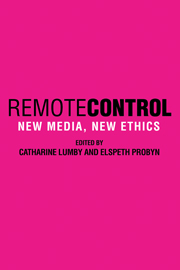Book contents
- Frontmatter
- Contents
- List of Contributors
- Acknowledgements
- 1 Introduction: An Ethics of Engagement
- 2 Real Appeal: The Ethics of Reality TV
- 3 Arguing about Ethics
- 4 ‘Their own media in their own language’
- Beyond the Disconnect: Practical Ethics
- 5 A Viable Ethics: Journalists and the ‘Ethnic Question’
- 6 Ethics, Entertainment and the Tabloid: The Case of Talkback Radio in Australia
- Money versus Ethics
- 7 Eating into Ethics: Passion, Food and Journalism
- Beyond Food Porn
- 8 Ethics impossible? Advertising and the Infomercial
- Pitching to the ‘Tribes’: New Ad Techniques
- 9 Diary of a Webdiarist: Ethics Goes Online
- 10 Control-SHIFT: Censorship and the Internet
- Representing the Asylum Seekers
- 11 The Ethics of Porn on the Net
- Ethics and Sex
- 12 Grassroots Ethics: The Case of Souths versus News Corporation
- 13 Great Pretenders: Ethics and the Rise of Pranksterism
- The Limits of Satire
- Index
The Limits of Satire
Published online by Cambridge University Press: 18 December 2009
- Frontmatter
- Contents
- List of Contributors
- Acknowledgements
- 1 Introduction: An Ethics of Engagement
- 2 Real Appeal: The Ethics of Reality TV
- 3 Arguing about Ethics
- 4 ‘Their own media in their own language’
- Beyond the Disconnect: Practical Ethics
- 5 A Viable Ethics: Journalists and the ‘Ethnic Question’
- 6 Ethics, Entertainment and the Tabloid: The Case of Talkback Radio in Australia
- Money versus Ethics
- 7 Eating into Ethics: Passion, Food and Journalism
- Beyond Food Porn
- 8 Ethics impossible? Advertising and the Infomercial
- Pitching to the ‘Tribes’: New Ad Techniques
- 9 Diary of a Webdiarist: Ethics Goes Online
- 10 Control-SHIFT: Censorship and the Internet
- Representing the Asylum Seekers
- 11 The Ethics of Porn on the Net
- Ethics and Sex
- 12 Grassroots Ethics: The Case of Souths versus News Corporation
- 13 Great Pretenders: Ethics and the Rise of Pranksterism
- The Limits of Satire
- Index
Summary
How did you feel when the ABC decided not to air your pilot? Did you believe they had legitimate reasons for rejecting it at the time?
Well, at the time they just said it was a creative decision. They kind of put me in a position where I couldn't really argue without looking like I just couldn't wear the umpire's decision. In retrospect, it was a bit, I don't know what the word is, not nice. At first it was just me coming up with crazy conspiracy theories in my head, but then Media Watch did a segment on the pilot. They followed the paper trail and produced a memo from Roger Grant, Head of Corporate Affairs at the ABC, who was also on the board. So then there was actually a bit of circumstantial evidence that there had been some pressure to try to stop the pilot being shown. And I'd argue that I wasn't being totally crazy to have come up with conspiracy theories in the first place because it's not like you switch on the ABC, or any channel, and see topnotch, brilliant entertainment twenty-four hours a day, seven days a week. I mean, they'd gone to the trouble of filming it, so why not use it?
Roger Grant argued to the Independent Complaints Review panel that the piece was biased against Ray Martin and failed to show the extent of intrusion into his privacy. What do you think he meant by these comments?
I don't know if there's a legal definition of what invading privacy is so I couldn't talk from that perspective, but from a layperson's point of view, I guess we did invade his privacy.
- Type
- Chapter
- Information
- Remote ControlNew Media, New Ethics, pp. 243 - 248Publisher: Cambridge University PressPrint publication year: 2003



